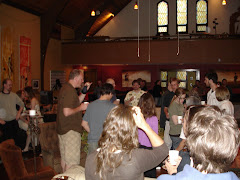Have you ever noticed that whenever someone in your church gets separated or divorced, they just stop coming to church? Have you ever known a mom who, upon finding out her kid is addicted to Ecstasy, stops attending worship? Or how about when a minister has a bout with depression and resigns his/her position, leaving the congregation in a cloud of mystery?
I’ve seen all these and more, up close and repeatedly. And it breaks my heart each and every time. The very people the church was designed for, the very people Jesus died for, come to feel unworthy of the church, embarrassed by the turns their lives have taken. What a travesty! Shouldn’t a church be the first place people want to be when they go through life’s travails? When and how did we get the idea that we're supposed to hide our struggles and our true selves from our church family?
While there are many institutional dynamics in Christian churches that have fostered this falseness and inability to include our human failings in our church relationships, I believe that much of the blame lies with the pastor(s). If the preacher refuses to talk about his/her own sins, shortcomings, and broken places, he/she unwittingly sends the message to the rest of the flock that “we don’t do that here.”
I once worked with a pastor who believed that he should never talk about himself or his own life in his sermons. He created the sense that he was a very “private” person, that his own family and foibles were somehow none of the congregation’s business. His reasoning for this approach was admirable, all in the name of protecting his loved ones and drawing boundaries between his personal and professional life. But over time, his congregation became fundamentally incapable of confronting difficult issues or even sharing their struggles with one another. Virtually every family in that church who went through any sort of crisis - from adolescent drug use to adult alcohol addiction, from divorce to foreclosure - would simply disappear, never to be heard from again.
Some wise soul once suggested that the church of Jesus Christ is more a hospital for sinners than a hotel for saints, but you’d never know that from the way most congregations conduct their business. The unwritten dress code for Sunday worship involves much more than our Sunday bests. Even where a tie isn’t required, a smile most certainly is. We Christians expect positive politeness, where every single “Hi, how are you?” is met with an enthusiastic “Just great! How are you?” This kind of social pressure is exerted with particular power on us pastors, which probably has something to do with the pastor I spoke of earlier. I, myself, am a pastor, and in almost every one of my annual reviews, the personnel committee tells me that I’m not smiley or cheery enough on Sunday mornings. How often I’ve been tempted to respond with something like this:
“Oh really? Not cheery enough, huh? Well just how cheery would you be if you’ve been getting 3 hours of sleep a night? How bright and wide would your smile be if you spent half of your last week in the hospital watching a few people die right in front of their families? It’s a little tough being cheery around here when last Sunday, after preaching my heart out, I got 7 calls from people who didn’t like the hymns I chose and a grand total of zero calls from those who were moved by or at least appreciated my sermon? Pardon me for not being Mr. Congeniality but I just found an ounce of pot in my 15 year-old’s backpack, and my wife isn’t speaking to me because I’ve been at church meetings every night for the past 8 days.”
But instead I just smile and say, “I’ll work on it next year.”
If the church is going to survive and have any sort of future, it’s going to have to learn to keep it real. It’s going to have to get over its infatuation with The Cleavers and start spending more time with Ozzy and the Osbornes
Monday
Subscribe to:
Post Comments (Atom)
Eloise Anna Jones

A Reader at 8 months!
papa and Weezie

it doesn't get any better than this!


















1 comment:
I loved this post, Toby. The concept of transparency in ministry is something we should not only strive for in ourselves as worship leaders, but something we should encourage all of those around us to model in order that all might be honest about who they are and what they believe.
Keep up the good work!
Andrew Pomerville
Post a Comment